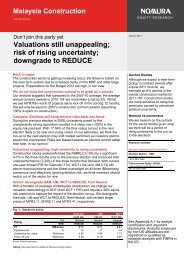Download PDF - ETP - Pemandu
Download PDF - ETP - Pemandu
Download PDF - ETP - Pemandu
Create successful ePaper yourself
Turn your PDF publications into a flip-book with our unique Google optimized e-Paper software.
Business Opportunities<br />
Growth in this area will come primarily from fixed broadband and<br />
data lines. Fixed broadband subscribers will grow by 10.5 per cent<br />
compound annual growth rate (CAGR), as existing fixed line users<br />
take advantage of bundled packages and consumer appetite for<br />
services such as IPTV, online gaming and music increase.<br />
Business Opportunity 1<br />
Fixed Services<br />
Fixed data lines will grow by 2.6 per cent CAGR as more companies<br />
require their own internal networks, contributing RM1.7 billion in<br />
incremental GNI and creating 3,250 new jobs by 2020.<br />
The industry has seen marginal growth of just under two per cent,<br />
representing a revenue rise of RM200 million which is a significant<br />
increase given the maturity of Malaysia’s fixed line business. The<br />
upturn is due to growing demand for data services and the advent<br />
of new applications that require higher bandwidth. The High<br />
Speed Broadband Project, a public-private partnership, has seen<br />
strong acceptance, surpassing the world benchmark for uptake in<br />
a supply driven project.<br />
Fixed-line services is seeing a greater uptake by the industry.<br />
The high mobile penetration rates have made the mobile<br />
players extend their services to include fixed line services. The<br />
technology convergence and expanded demand has also seen<br />
satellite players incorporating fixed services into their offering.<br />
The constant market competition, technology convergence and<br />
expanded demand by the end users will see a further demand for<br />
fixed services largely concentrating on data and no longer voice.<br />
Business Opportunity 2<br />
Mobile Services<br />
Subscriptions to mobile services are expected to increase in all<br />
segments: voice, data and broadband, contributing RM3.6 billion<br />
in incremental GNI and creating 5,788 new jobs by 2020. Voice<br />
lines will rise by 2.7 per cent CAGR due to Malaysia’s growing<br />
population and subscribers’ increasing tendency to have multiple<br />
mobile accounts. Mobile data, inclusive of SMS, content and<br />
services that do not require internet connections will grow in<br />
line with subscriber uptake. Mobile broadband subscription will<br />
see the most significant rise of 10.5 per cent CAGR as 3G users<br />
begin to access the Internet, more advanced devices encourage<br />
Malaysians to use their mobile phones as their primary means of<br />
Internet access and lower costs allow mobile Internet access to<br />
become more affordable.<br />
As at the first half of 2011, mobile penetration rate stood at 123.5<br />
per cent or 35.3 million subscribers of which 80 per cent are prepaid<br />
users. Meanwhile, 3G subscriptions are at 9.8 million.<br />
The higher demand for data will see a demand for new spectrum<br />
to be made available to the market. This is further compounded<br />
by technology advancement such as Long Term Evolution (LTE). In<br />
addition, increased competition and technology convergence will<br />
see new services being offered which may impact the margins of<br />
the players. This is only to be expected in such a mature market.<br />
NKEA: Communications Content and Infrastructure EPP 10 and Business Opportunities<br />
Business Opportunity 3<br />
Courier, Post and Broadcast<br />
Courier, post and broadcast GNI contribution will grow by 5.2 per<br />
cent annually over the next ten years, contributing RM1.6 billion in<br />
incremental GNI and creating 7,563 new jobs by 2020.<br />
This sector will also offer a broader range of services including<br />
commercial transaction fulfilment, warehousing, inventory<br />
management, demand planning for manufacturers and assembly<br />
services. MCMC’s new multi-tiered licensing system will impose<br />
higher requirements for top-tier licence holders and encourage<br />
consolidation, raising the sector’s investment capacity.<br />
The post and courier sector also has the opportunity to capitalise<br />
on the expected growth in electronic commerce by offering<br />
services specifically designed to meet merchant needs. Additional<br />
opportunities also exist in regional logistics expansion.<br />
Based on the recent development of the market for post and<br />
courier services as a result of divestment of equity by the<br />
government investment arm in Pos Malaysia, new services will be<br />
introduced for the betterment of the public.<br />
The entry of a new Japanese courier provider Ta-Q-Bin that began<br />
its services in September 2011 will see the market move into<br />
a more specialised service. Pos Malaysia too has expanded its<br />
courier portfolio to offer more personalised services including<br />
home services through its partnership with VADS.<br />
Even though paid broadcasting penetration has almost plateaued,<br />
new opportunities for the broadcast sector will open up as<br />
new services are introduced. Digital Terrestrial TV will permit<br />
more channels to be broadcast and positively impact revenues<br />
beginning 2014 when MCMC plans to mandate the switching off<br />
of analogue broadcasting.<br />
Digital Terrestrial TV will see the regulator tendering out for the<br />
private sector in the fourth quarter of 2011. This will start the<br />
process of analog conversion to digital in a more coordinated way<br />
as well as realise the importance of the Digital Spectrum dividend<br />
in the era of broadband.<br />
Upside opportunities may also come from mobile TV and 3D TV<br />
content, with solutions being explored to address content creation<br />
for these new channels and overcoming barriers to adoption.<br />
On broadcasting, much will be dependent on the outcome of the<br />
DTTB tender as 2012 will see the initial planning and rollout by<br />
the industry with challenges from market dynamics to ensure that<br />
this is a viable business.<br />
Business Opportunity 4<br />
Regional Operations<br />
Malaysian companies in this sector such as Axiata, Maxis and<br />
Astro are aggressively pursuing opportunities in large and rapidly<br />
growing markets such as Indonesia, India and Bangladesh. These<br />
investments currently account for approximately RM2.5 billion of GNI<br />
and will generate additional GNI of RM4.8 billion with 664 new jobs<br />
by 2020.<br />
161








